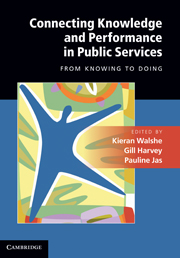Book contents
- Frontmatter
- Contents
- List of figures
- List of tables
- List of boxes
- Notes on contributors
- Foreword
- 1 Introduction: knowledge and performance – theory and practice
- 2 Knowledge from inspection: external oversight and information to improve performance
- 3 How is information used to improve performance in the public sector? Exploring the dynamics of performance information
- 4 Citizens, users or consumers: the voice of the public and its influence on improving performance
- 5 Competition and choice: the place of markets in connecting information and performance improvement
- 6 The role of corporate governance and boards in organisational performance
- 7 Change at the top: connecting political and managerial transitions with performance
- 8 The role of leadership in knowledge creation and transfer for organisational learning and improvement
- 9 Process Improvement and Lean Thinking: using knowledge and information to improve performance
- 10 Using evidence: how social research could be better used to improve public service performance
- 11 Absorptive capacity: how organisations assimilate and apply knowledge to improve performance
- 12 Knowing through doing: unleashing latent dynamic capabilities in the public sector
- 13 Conclusions: a puzzle, three pieces, many theories and a problem
- Index
- References
4 - Citizens, users or consumers: the voice of the public and its influence on improving performance
Published online by Cambridge University Press: 05 July 2011
- Frontmatter
- Contents
- List of figures
- List of tables
- List of boxes
- Notes on contributors
- Foreword
- 1 Introduction: knowledge and performance – theory and practice
- 2 Knowledge from inspection: external oversight and information to improve performance
- 3 How is information used to improve performance in the public sector? Exploring the dynamics of performance information
- 4 Citizens, users or consumers: the voice of the public and its influence on improving performance
- 5 Competition and choice: the place of markets in connecting information and performance improvement
- 6 The role of corporate governance and boards in organisational performance
- 7 Change at the top: connecting political and managerial transitions with performance
- 8 The role of leadership in knowledge creation and transfer for organisational learning and improvement
- 9 Process Improvement and Lean Thinking: using knowledge and information to improve performance
- 10 Using evidence: how social research could be better used to improve public service performance
- 11 Absorptive capacity: how organisations assimilate and apply knowledge to improve performance
- 12 Knowing through doing: unleashing latent dynamic capabilities in the public sector
- 13 Conclusions: a puzzle, three pieces, many theories and a problem
- Index
- References
Summary
Introduction
Policy is important not only because it sets parameters for rules and resources in public services, but also because of the way it positions service professionals and the public in particular roles in relation to one another (Propper 1995; Deacon and Mann 1999; Hoggett 2001; Greener 2002). The roles of professionals will change significantly whether they are meant to be providing a service that treats individual users as consumers of their service in a market relationship, or whether they are meant to be providing professional expertise to more passive clients in monopoly-like provision (Greener and Powell, in press). Equally, constituting the public in relatively passive or active roles in relation to public services changes the nature of the public's relationship to them, and adds or takes away mechanisms by which the public may be able to drive improvement. If I am able to exit from a public provider and move to another if I don't like the service I am receiving, or choose between services, then that will provide a different basis for interacting with that service than if I am expected to negotiate improvement with the public professional I am unhappy with, or campaign with others for the improvement of local services when I find them unsatisfactory (Hirschman 1970).
The positioning of public service users in relation to services and to their professionals presents a number of possibilities from the public being constituted extremely actively, where they are given a significant role in improving services, to relative passivity, where mechanisms other than user voice or public engagement have to be found (Le Grand 1997).
- Type
- Chapter
- Information
- Connecting Knowledge and Performance in Public ServicesFrom Knowing to Doing, pp. 55 - 73Publisher: Cambridge University PressPrint publication year: 2010
References
- 1
- Cited by



